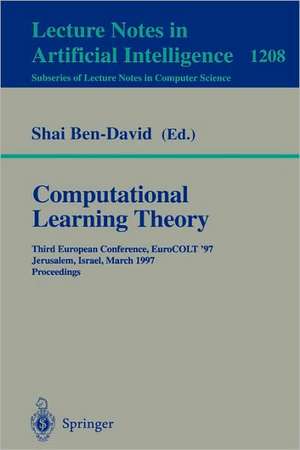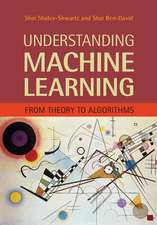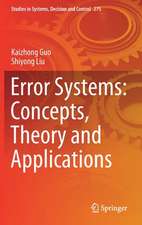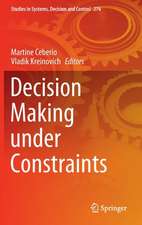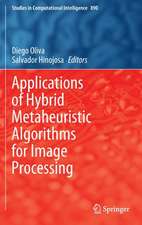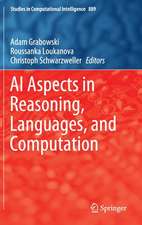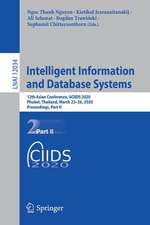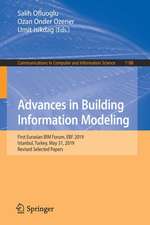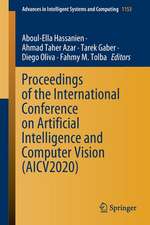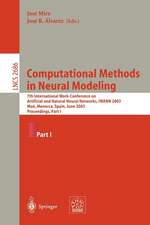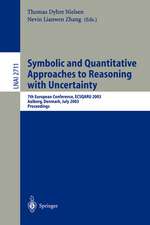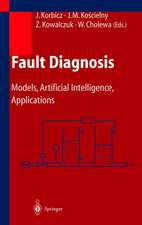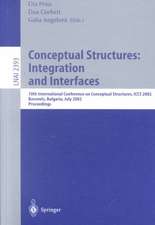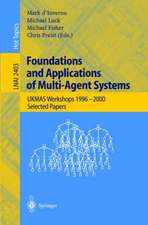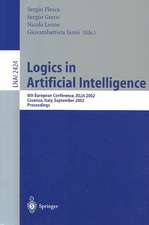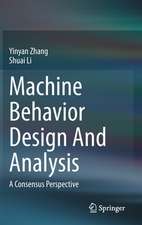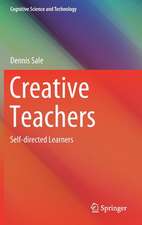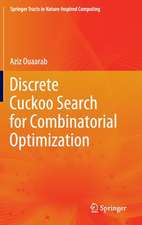Computational Learning Theory: Third European Conference, EuroCOLT '97, Jerusalem, Israel, March 17 - 19, 1997, Proceedings: Lecture Notes in Computer Science, cartea 1208
Editat de Shai Ben-Daviden Limba Engleză Paperback – 3 mar 1997
The book presents 25 revised full papers carefully selected from a total of 36 high-quality submissions. The volume spans the whole spectrum of computational learning theory, with a certain emphasis on mathematical models of machine learning. Among the topics addressed are machine learning, neural nets, statistics, inductive inference, computational complexity, information theory, and theoretical physics.
Din seria Lecture Notes in Computer Science
- 20%
 Preț: 1061.55 lei
Preț: 1061.55 lei - 20%
 Preț: 307.71 lei
Preț: 307.71 lei - 20%
 Preț: 438.69 lei
Preț: 438.69 lei - 20%
 Preț: 645.28 lei
Preț: 645.28 lei -
 Preț: 410.88 lei
Preț: 410.88 lei - 15%
 Preț: 580.46 lei
Preț: 580.46 lei - 17%
 Preț: 427.22 lei
Preț: 427.22 lei - 20%
 Preț: 596.46 lei
Preț: 596.46 lei -
 Preț: 449.57 lei
Preț: 449.57 lei - 20%
 Preț: 353.50 lei
Preț: 353.50 lei - 20%
 Preț: 1414.79 lei
Preț: 1414.79 lei - 20%
 Preț: 309.90 lei
Preț: 309.90 lei - 20%
 Preț: 583.40 lei
Preț: 583.40 lei - 20%
 Preț: 1075.26 lei
Preț: 1075.26 lei - 20%
 Preț: 310.26 lei
Preț: 310.26 lei - 20%
 Preț: 655.02 lei
Preț: 655.02 lei - 20%
 Preț: 580.93 lei
Preț: 580.93 lei - 20%
 Preț: 340.32 lei
Preț: 340.32 lei - 18%
 Preț: 938.83 lei
Preț: 938.83 lei - 20%
 Preț: 591.51 lei
Preț: 591.51 lei - 15%
 Preț: 438.59 lei
Preț: 438.59 lei - 20%
 Preț: 337.00 lei
Preț: 337.00 lei -
 Preț: 389.48 lei
Preț: 389.48 lei - 20%
 Preț: 607.39 lei
Preț: 607.39 lei - 20%
 Preț: 1024.44 lei
Preț: 1024.44 lei - 20%
 Preț: 579.30 lei
Preț: 579.30 lei - 20%
 Preț: 763.23 lei
Preț: 763.23 lei - 20%
 Preț: 453.32 lei
Preț: 453.32 lei - 20%
 Preț: 575.48 lei
Preț: 575.48 lei - 20%
 Preț: 585.88 lei
Preț: 585.88 lei - 20%
 Preț: 825.93 lei
Preț: 825.93 lei - 20%
 Preț: 763.23 lei
Preț: 763.23 lei - 17%
 Preț: 360.19 lei
Preț: 360.19 lei - 20%
 Preț: 1183.14 lei
Preț: 1183.14 lei - 20%
 Preț: 340.32 lei
Preț: 340.32 lei - 20%
 Preț: 504.57 lei
Preț: 504.57 lei - 20%
 Preț: 369.12 lei
Preț: 369.12 lei - 20%
 Preț: 583.40 lei
Preț: 583.40 lei - 20%
 Preț: 343.62 lei
Preț: 343.62 lei - 20%
 Preț: 350.21 lei
Preț: 350.21 lei - 20%
 Preț: 764.89 lei
Preț: 764.89 lei - 20%
 Preț: 583.40 lei
Preț: 583.40 lei - 20%
 Preț: 649.49 lei
Preț: 649.49 lei - 20%
 Preț: 341.95 lei
Preț: 341.95 lei - 20%
 Preț: 238.01 lei
Preț: 238.01 lei - 20%
 Preț: 538.29 lei
Preț: 538.29 lei
Preț: 334.86 lei
Preț vechi: 418.57 lei
-20% Nou
Puncte Express: 502
Preț estimativ în valută:
64.07€ • 67.08$ • 53.02£
64.07€ • 67.08$ • 53.02£
Carte tipărită la comandă
Livrare economică 07-21 aprilie
Preluare comenzi: 021 569.72.76
Specificații
ISBN-13: 9783540626855
ISBN-10: 3540626859
Pagini: 348
Ilustrații: CCCXLVIII, 338 p.
Dimensiuni: 155 x 235 x 18 mm
Greutate: 0.49 kg
Ediția:1997
Editura: Springer Berlin, Heidelberg
Colecția Springer
Seriile Lecture Notes in Computer Science, Lecture Notes in Artificial Intelligence
Locul publicării:Berlin, Heidelberg, Germany
ISBN-10: 3540626859
Pagini: 348
Ilustrații: CCCXLVIII, 338 p.
Dimensiuni: 155 x 235 x 18 mm
Greutate: 0.49 kg
Ediția:1997
Editura: Springer Berlin, Heidelberg
Colecția Springer
Seriile Lecture Notes in Computer Science, Lecture Notes in Artificial Intelligence
Locul publicării:Berlin, Heidelberg, Germany
Public țintă
ResearchCuprins
Sample compression, learnability, and the Vapnik-Chervonenkis dimension.- Learning boxes in high dimension.- Learning monotone term decision lists.- Learning matrix functions over rings.- Learning from incomplete boundary queries using split graphs and hypergraphs.- Generalization of the PAC-model for learning with partial information.- Monotonic and dual-monotonic probabilistic language learning of indexed families with high probability.- Closedness properties in team learning of recursive functions.- Structural measures for games and process control in the branch learning model.- Learning under persistent drift.- Randomized hypotheses and minimum disagreement hypotheses for learning with noise.- Learning when to trust which experts.- On learning branching programs and small depth circuits.- Learning nearly monotone k-term DNF.- Optimal attribute-efficient learning of disjunction, parity, and threshold functions.- learning pattern languages using queries.- On fast and simple algorithms for finding Maximal subarrays and applications in learning theory.- A minimax lower bound for empirical quantizer design.- Vapnik-Chervonenkis dimension of recurrent neural networks.- Linear Algebraic proofs of VC-Dimension based inequalities.- A result relating convex n-widths to covering numbers with some applications to neural networks.- Confidence estimates of classification accuracy on new examples.- Learning formulae from elementary facts.- Control structures in hypothesis spaces: The influence on learning.- Ordinal mind change complexity of language identification.- Robust learning with infinite additional information.
